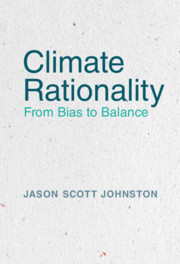
- Publisher:
- Cambridge University Press
- Online publication date:
- July 2021
- Print publication year:
- 2021
- Online ISBN:
- 9781108234917


Most environmental statutes passed since 1970 have endorsed a pragmatic or 'precautionary' principle under which the existence of a significant risk is enough to trigger regulation. At the same time, targets of such regulation have often argued on grounds of inefficiency that the associated costs outweigh any potential benefits. In this work, Jason Johnston unpacks and critiques the legal, economic, and scientific basis for precautionary climate policies pursued in the United States and in doing so sheds light on why the global warming policy debate has become increasingly bitter and disconnected from both climate science and economics. Johnston analyzes the most influential international climate science assessment organizations, the US electric power industry, and land management and renewable energy policies. Bridging sound economics and climate science, this pathbreaking book shows how the United States can efficiently adapt to a changing climate while radically reducing greenhouse gas emissions.
'Johnston’s comprehensive and lively treatment of climate change, climate change policy, and climate change politics is a welcome contribution - a terrific resource for the non-specialist who wants to think critically about the challenges posed by climate change and the efforts to ameliorate it.'
Wally Thurman - William Neal Reynolds Professor of Agricultural and Resource Economics, North Carolina State University
'Jason S. Johnston's Climate Rationality is the definitive indictment and takedown of subjective climate ‘authorities’ like the IPCC and the various US ‘Assessments’ of climate change. Johnston's work is so comprehensive that he may well be the historic figure who singlehandedly kills the climate bogeyman.'
Patrick J. Michaels - Past-President, American Association of State Climatologists
'Professor Johnston has provided a much-needed, rigorous independent assessment of the climate issue. He has documented, as he writes, ‘climate assessments produced by IPCC and the USGCRP produce biased science advocacy rather than the balanced, objective consideration necessary for rational policy design.’ The implications of that advocacy on policy are far reaching, and the book discusses its consequences in detail. This book should be read by not only policymakers, but scientists in disciplines who use climate information in their impacts studies.'
Roger Pielke, Sr - Professor Emeritus, Colorado State University, Research Scientist, CIRES, University of Colorado, Boulder
'Johnston’s exhaustive analysis shows that governments and courts alike need to realize the IPCC is not what it appears: longstanding procedural flaws have allowed it to function as an advocacy group while claiming to be a science authority. This book is a critical contribution to understanding and fixing the problem.'
Ross McKitrick - Professor of Economics, Departments of Economics and Finance, University of Guelph, Ontario
 Loading metrics...
Loading metrics...
* Views captured on Cambridge Core between #date#. This data will be updated every 24 hours.
Usage data cannot currently be displayed.